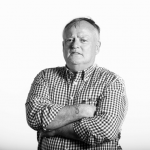Helping Hands
South32 has partnered with a charity to combat one of the world’s cruellest diseases


The resources company is supporting the MJD Foundation to fund research and manage cases on Groote Eylandt
“South32 has always been community minded,” says foundation director of research and education Libby Massey, who was brought up on Groote. “Their help is extremely important to us.”
The company has been a major supporter of the MJD Foundation since it was founded in May 2008 and has been a key factor in improving the quality of life for Aboriginal people living on Groote and suffering from the condition.
MJD, as Machado-Joseph disease is usually known, is quite common among Indigenous people on the island and the mainland community of Yirrkala.
But it was known as Groote Eylandt Syndrome until medical researcher Tim Burt made an accurate diagnosis in 1995.
There are 187 people on Groote with symptoms and a further 780 are considered at risk.
Aboriginal people are more likely to develop the disease and die younger from it than non-Indigenous Australians.
MJD is caused by a fault in a chromosome, which leads to the production of an abnormal protein.
The protein causes nerve cells to die prematurely in the brain’s cerebellum, which in turn causes muscular weakness and eventually to total lack of voluntary control over the body, particularly in the last five years of their lives.
There is no known cure.
The mean survival time from the onset of symptoms to death is 21 years. Either gender can be affected, and sufferers have a 50 percent chance of passing it to their children – rising to 75 percent if both parents are afflicted.
MJD is usually found in adults, but two young children on Groote have been diagnosed with the condition and one died at the age of only 21.
Children who might otherwise be able to care for parents severely disabled by the disease are often themselves disabled, sometimes more rapidly than their parents.
In remote Aboriginal communities, the problem is exacerbated by limited local health and disability services, and rudimentary or non-existent access to preventative, rehabilitative, therapeutic, allied health interventions, health education and genetic services.
The Machado Joseph Disease Foundation was established on Groote to provide locally accessible, appropriate and sustainable care for Aboriginal sufferers.
It has now expanded to other Aboriginal communities in the Top End and north Queensland.
“We provide community services, such as therapeutic help and case management, and support research and education,” says Ms Massey.
The foundation works with Traditional Owners.
Gayangwa Lalara OAM is vice-chair and Anindilyakwa Land Council chair Tony Wurramarrba AO is on the board.
Ms Lalara understands the hardship and tragedy of MJD more than most.
Her father developed the disease when he was an older man, and all six of her brothers and sisters were affected by their forties. She was the primary carer for two of her sisters’ children for more than 15 years.
The third generation of her family is now sick – her niece passed away at the age of 21 in 2014, and she has nieces, nephews and grandchildren with the disease.
The MJD Foundation says that Ms Lalara’s journey through “shame and blame” to proud champion is an inspiration to others.
Mr Wurramarrba is credited with helping build the land council into a strong organisation working hard to secure his people’s future.